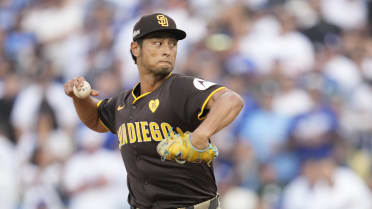NEW YORK -- Willie Mays passed away last week, but his life and legacy lives on at Citi Field. On Wednesday evening, the Mets had his son, Michael, throw out the first pitch before the team faced the Yankees.
Willie Mays was a member of the Mets for more than a year and his impact was felt in Flushing, Queens, starting in 1972. In fact, the team went as far as the World Series the following season. The Mets didn’t forget what he did in those final two years of his career that they retired his No. 24 on Aug. 27, 2022.
Fifty years before, there was a lot to be excited about at Shea Stadium on May 11, 1972. The Mets made news by acquiring Mays from the Giants in a trade for right-hander Charlie Williams and $50,000. This was Mays’ second go-round in New York. He was the king of the Big Apple for seven years in the 1950s when the Giants played in the Polo Grounds. Mays had millions of fans in the tri-state area, but none bigger than the Mets’ principal owner, Joan Payson, who was a minority owner of the Giants back in the 1950s.
Willie Mays, 1931-2024:
- Willie Mays, a baseball giant, dies at 93
- Loss of Mays leaves Giants heartbroken in Chicago
- 'My heart is on the floor': Baseball world reacts to Mays' passing
- Rickwood Field game has new meaning: Mays will 'be watching over'
- Timeline of the Say Hey Kid's legendary career
- Griffey grateful for time with Mays, 'the godfather of center fielders'
- Cutch remembers Mays: 'He was a pioneer for the game'
- 24 amazing Willie Mays stats
- Willie Mays' best moments
- Mays always knew he'd make The Catch
- Willie Mays learned the game in the Negro Leagues
- Mays, Clemente in same outfield? It happened
- The thing that stopped Aaron-Mays OF? $50
- Mays' pure joy for baseball made him the GOAT
- The day Mays nearly sat out but hit 4 HRs instead
- Mays' last dance in NY came with '73 Mets
According to Michael, playing for the Mets was a full-circle moment for Willie because of his legendary status in the Big Apple.
“It was very tough to leave San Francisco,” Michael remembered. “I understand that as a franchise player, it didn’t make sense [to his teammates in San Francisco], like, ‘What’s happening?’ So to have Ms. Payson step in and make the promise … that he was coming home [was great].”
When he joined the Mets, Mays was past his prime at 41 years old. Gone were the power numbers and the high batting average. During his two years with the Mets, Mays was hampered by a left knee injury. But to his teammates, Mays was a great addition to the ballclub, despite hitting a combined .238 with 14 home runs and 44 RBIs in 135 games. Mays looked out for everybody on the team. If the team went out to dinner and left-hander Jon Matlack was pitching the next day, Mays would tell him, “Go home and get some sleep. You are pitching tomorrow.”
It was in Mays’ final season in which he helped the Mets reach the postseason. The Say Hey Kid managed to get big hits in October. In the pennant clincher against the Reds in the National League Championship Series, Mays entered the game in the fifth inning as a pinch-hitter for Ed Kranepool and hit an infield single that scored Felix Millan to give New York a 4-2 lead. The Mets ended up winning the game, 7-2, and advanced to the World Series.
With the score tied at 6 in the top of the 12th inning in Game 2 of the World Series against the Athletics, Mays singled up the middle off closer Rollie Fingers, plating Bud Harrelson and giving New York a 7-6 lead. It was the last hit of Mays’ career.
Michael was up close watching his father play his final games. He was one of the team’s batboys and sometimes worked in the clubhouse.
“That was a cool time,” Michael said. “In my own little way, I got to be on the field with him because he would drive in and drive home. I remember us being together. That was a Mets time.”
The only thing Michael wished for was to see his father get one last at-bat in Game 7 of the '73 World Series.
Down, 5-2, in the ninth inning, the Mets had runners on first and second, with two outs. Wayne Garrett came to the plate as the tying run facing left-hander Darold Knowles. Michael wished that manager Yogi Berra called on Willie to pinch-hit. It never happened, however, as Garrett, a left-handed hitter, popped up to shortstop Bert Campaneris to end the series.
“If I were Yogi, I would have had [Willie] swing -- at least walk out there or something,” Michael said. “I can’t understand that part of history. I would say stranger things have happened, but that’s the strangest thing [that happened].”
Bill Ladson has been a reporter for MLB.com since 2002. He covered the Nationals/Expos from 2002-2016.




